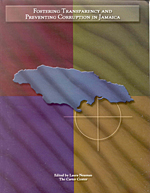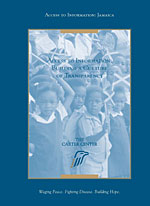In 1998, Prime Minister P.J. Patterson requested that The Carter Center undertake a project in Jamaica with the intent of transforming Jamaica into a model country of transparency and good governance in the Caribbean. The Center, in consultation with the government, identified access to information as an important step toward meeting this goal. Since his election in September 2007, Prime Minister Golding has continued supporting transparency in government, including note of its value in his speeches and convening a group of respected leaders to consider a number of laws that influence freedom of expression and information in Jamaica.
 During the passage stage of the Access to Information Act, The Carter Center presented observations of the draft bill and organized activities to involve a variety of stakeholders in this process. The Center cosponsored seminars to stimulate debate among Jamaican parliamentarians, citizen groups, media, and the private sector and advised government officials and citizen groups on the emerging international norms. To inform the debate about the draft access to information law, the Center commissioned papers from international and local experts and produced two guidebooks titled "Combating Corruption in Jamaica" and "Fostering Transparency and Preventing Corruption in Jamaica (PDF)." Carter Center staff and consultants provided technical assistance to legislators tasked with drafting and revising the law and presented testimony to the Parliamentary Commission. In July 2002, the Access to Information Act was passed with more than 40 amendments recommended from civil society and The Carter Center.
During the passage stage of the Access to Information Act, The Carter Center presented observations of the draft bill and organized activities to involve a variety of stakeholders in this process. The Center cosponsored seminars to stimulate debate among Jamaican parliamentarians, citizen groups, media, and the private sector and advised government officials and citizen groups on the emerging international norms. To inform the debate about the draft access to information law, the Center commissioned papers from international and local experts and produced two guidebooks titled "Combating Corruption in Jamaica" and "Fostering Transparency and Preventing Corruption in Jamaica (PDF)." Carter Center staff and consultants provided technical assistance to legislators tasked with drafting and revising the law and presented testimony to the Parliamentary Commission. In July 2002, the Access to Information Act was passed with more than 40 amendments recommended from civil society and The Carter Center.
The Access to Information Act went into effect in 2004, providing approximately 18 months for preparation and implementation activities. The Carter Center supported the Jamaican government's implementation efforts with technical assistance, convening of meetings, and training, while continuing to work with civil society to develop methodologies for monitoring government compliance and use of the law. To increase awareness of the law, the Center's project facilitated workshops for civil servants, civil society organizations, the media, unions, and the private sector. Meetings with high-ranking officials served to outline priorities and potential obstacles and to identify feasible solutions to ensure an effective Access to Information Act. The Center's efforts related to implementation also included its presence on the Access to Information Act Stakeholders Committee to provide technical assistance when requested and support of Jamaicans for Justice in their monitoring of the Access to Information Act's use and government response.
 A right is only as powerful as one's ability to enforce it. In the event that a request for information is denied, the requestor has the option to appeal the decision. For this reason, the Center, in collaboration with the Jamaican Bar Association and the Independent Jamaica Counsel for Human Rights, facilitated the creation of a Volunteer Attorneys Panel (VAP) of law professionals willing to take test cases pro bono. The availability of free representation has ensured access to courts for indigent people and nonprofit civil society organizations. More than 50 attorneys have registered for the VAP, and The Carter Center has provided training and relevant materials to all members. The Center also provided technical assistance to the Jamaican Access to Information Appeals Tribunal in its analysis of various enforcement models and regulations.
A right is only as powerful as one's ability to enforce it. In the event that a request for information is denied, the requestor has the option to appeal the decision. For this reason, the Center, in collaboration with the Jamaican Bar Association and the Independent Jamaica Counsel for Human Rights, facilitated the creation of a Volunteer Attorneys Panel (VAP) of law professionals willing to take test cases pro bono. The availability of free representation has ensured access to courts for indigent people and nonprofit civil society organizations. More than 50 attorneys have registered for the VAP, and The Carter Center has provided training and relevant materials to all members. The Center also provided technical assistance to the Jamaican Access to Information Appeals Tribunal in its analysis of various enforcement models and regulations.
Without a vibrant constituency of users, the access to information law would quickly atrophy. For that reason, the Center project worked with local civil society organizations and relevant stakeholders to raise awareness of the right to information and to encourage the law's use. Activities included supporting the establishment of a civil society network of users, assisting in the recognition of International Right to Know Day in Jamaica, and organizing workshops on use of access to information in investigative journalism, environmental protection, and rights of vulnerable persons. Read Laura Neuman's "International Right to Know Day" speech, delivered Sept. 28, 2004, in Jamaica.
In March 2004, the Center opened a field office to provide programmatic continuity during the implementation and enforcement phases. This office served as an in-country resource to government and civil society partners. Carole Excell served as the field office director and led the efforts to establish the VAP and the innovative Journalism Awards for students, to support the Stakeholders Committee, and to engage disparate civil society and community based organizations in using the Act. The field office closed in June 2006.
At the conclusion of the Carter Center's focused work in Jamaica, a large conference with international speakers and representatives from a number of neighboring Caribbean countries was held. At the conference, the Center presented its final publication "Access to Information: Building a Culture of Transparency," which focused on implementation, enforcement, and use of the law from 2002-2006.
For more information regarding the Jamaica Access to Information Project or any of the Carter Center's work on the right to information, please contact program director Laura Neuman at laura.neuman@cartercenter.org.
Please sign up below for important news about the work of The Carter Center and special event invitations.